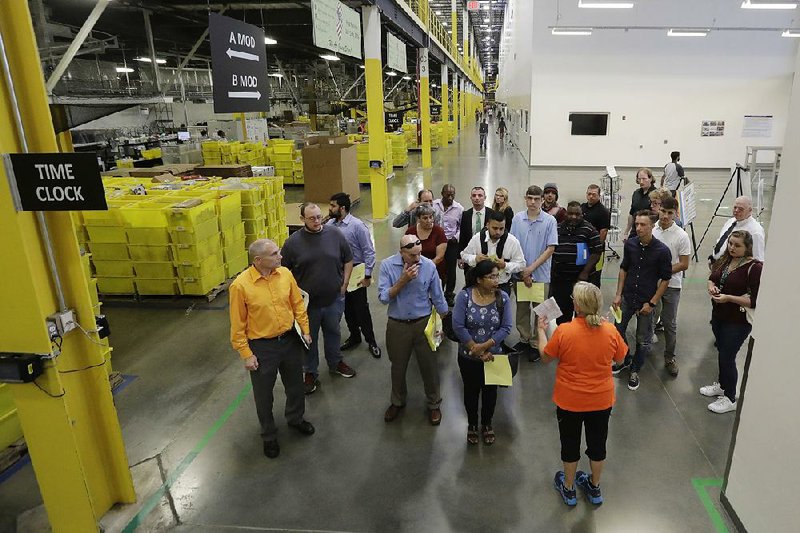WASHINGTON -- President Donald Trump on Wednesday renewed his attack on e-commerce giant Amazon, saying the company is "doing great damage to tax paying retailers."
Trump, in a tweet, said "towns, cities and states throughout the U.S. are being hurt -- many jobs being lost!"
The president has been a frequent critic of the company and Chief Executive Officer Jeff Bezos, who also owns The Washington Post.
Amazon did not immediately respond to an emailed request for comment.
[PRESIDENT TRUMP: Timeline, appointments, executive orders + guide to actions in first 200 days]
It's not the first time Trump has said something critical of Amazon, but it's the first time Trump has said Amazon is having a negative impact on Main Street jobs.
Many traditional retailers are closing stores and blaming Amazon for a shift to buying goods online. But the company has been hiring thousands of warehouse workers on the spot at job fairs across the country. Amazon has announced a goal of adding 100,000 full-time workers by the middle of next year.
Trump has said Amazon does not pay "Internet taxes," but it's unclear what he meant by that. Amazon.com collects state sales taxes in all 45 states with a sales tax and the District of Columbia, according to Amazon's website. State governments have sought to capture sales taxes lost to Internet retailers, though they have struggled with a 1992 Supreme Court ruling that found that for a state to collect sales taxes from a retailer, the retailer must have a physical presence within state borders.
The issue arose recently in South Carolina, which is attempting to get tax revenue that it says it's owed. This summer, the state Department of Revenue filed a case with the Administrative Law Court, alleging that Amazon had failed to collect taxes on third-party merchant sales.
Third-party merchant sales involve items that can be bought on Amazon.com, but Amazon acts solely as a middleman between buyers and sellers. Amazon processes the payments and offers other support to the parties involved.
South Carolina claims that Amazon owes it $12.5 million in taxes, penalties and interest from the first quarter of last year alone, according to the complaint obtained by The Associated Press.
Amazon had a five-year moratorium on taxes, the state wrote in the complaint, giving the company "fair warning that its sales of tangible personal property in South Carolina subjected it to South Carolina's taxing jurisdiction."
The state's case is in the early stages, and a court date has not been set.
For years, the Seattle company fought against collecting sales taxes from its customers. According to the National Conference of State Legislatures, South Carolina was among 10 states that initially gave Amazon a temporary tax reprieve in exchange for jobs and investment, voting in 2011 to give the company until the beginning of 2016 before the state levied taxes.
According to the conference, that deal made South Carolina the last state to collect among those where officials cut similar deals with Amazon. The company promised to create at least 2,000 full-time jobs and invest $125 million by Dec. 31, 2013. It opened two distribution centers in the state.
Max Behlke, who has been tracking this issue for the conference, said dozens of states have been grappling with how to collect taxes from entities like Amazon, with several heading to court over it in recent years. As for the South Carolina case, Behlke said it could lead to more actions elsewhere.
"If the court ends up ruling in favor of the state, then I can almost guarantee you that we're going to see other state tax departments handling it similarly, too," he said.
Trump's reference to "great damage" in his tweet echoes chatter in Washington and academic circles that Amazon and other technology companies may have become too big and powerful. Apple Inc., Alphabet Inc., Microsoft Corp., Facebook Inc. and Amazon are the biggest companies in the world by market cap and dominate many facets of everyday life. Some critics have even suggested that they should be broken up.
During the presidential campaign, Trump said Amazon was a monopoly that he would go after for antitrust violations if he were elected. Amazon takes about 70 percent of all e-book sales and 30 percent of all U.S. e-commerce. "Believe me, if I become president, do they have problems. They're going to have such problems," Trump said in February 2016. In the U.S. it isn't illegal to have a large market share.
In June, Amazon agreed to buy Whole Foods Market Inc. Experts and analysts have largely dismissed antitrust threats for the world's largest online retailer, though a U.S. lawmaker has called for hearings on the proposed deal to consider its ramifications for shoppers and workers.
While it's unclear what prompted Trump's tweet, The Washington Post published an editorial critical of Trump in the newspaper Wednesday, and there were also pro-tax reform advertisements that ran on early morning talk shows.
Trump's tweet about jobs lands amid one of the most tumultuous years in the industry's history. Retailers, especially apparel sellers, are suffering from sluggish mall traffic and an exodus of shoppers to e-commerce.
A rash of chains have filed for bankruptcy this year, including Payless Inc., Gymboree and HHGregg Inc. and RadioShack. And the biggest department store companies, such as Macy's Inc., Sears Holdings Corp. and J.C. Penney Co., are closing hundreds of locations. The total number of store closings is expected to hit a record in the U.S. this year, with Credit Suisse Group AG analyst Christian Buss estimating that the number could exceed 8,000.
Amazon shares fell $4.56 to close Wednesday at $978.18.
Information for this article was contributed by The Associated Press; by Giles Turner and Nick Turner of Bloomberg News; and by Angel Gonzalez of The Seattle Times.
Business on 08/17/2017
